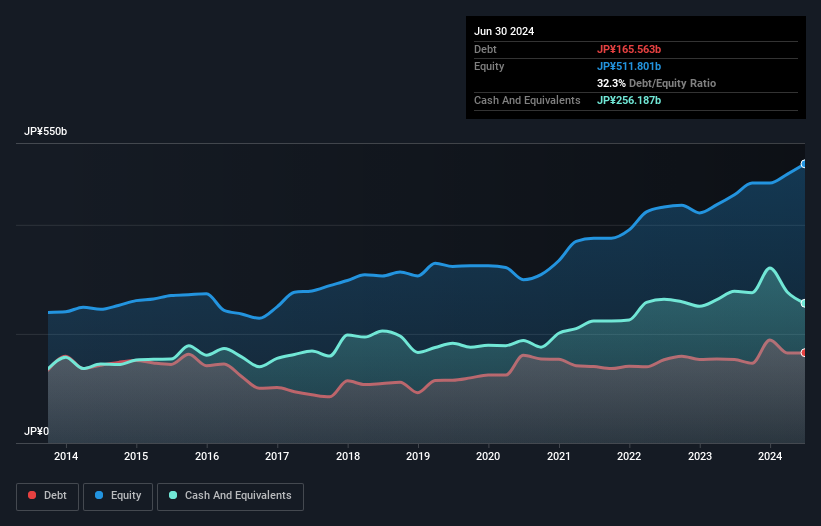The external fund manager backed by Berkshire Hathaway's Charlie Munger, Li Lu, makes no bones about it when he says 'The biggest investment risk is not the volatility of prices, but whether you will suffer a permanent loss of capital.' So it seems the smart money knows that debt - which is usually involved in bankruptcies - is a very important factor, when you assess how risky a company is. Importantly, Toyota Boshoku Corporation (TSE:3116) does carry debt. But is this debt a concern to shareholders?
When Is Debt Dangerous?
Debt and other liabilities become risky for a business when it cannot easily fulfill those obligations, either with free cash flow or by raising capital at an attractive price. Ultimately, if the company can't fulfill its legal obligations to repay debt, shareholders could walk away with nothing. While that is not too common, we often do see indebted companies permanently diluting shareholders because lenders force them to raise capital at a distressed price. Of course, debt can be an important tool in businesses, particularly capital heavy businesses. When we examine debt levels, we first consider both cash and debt levels, together.
Check out our latest analysis for Toyota Boshoku
What Is Toyota Boshoku's Debt?
The image below, which you can click on for greater detail, shows that at June 2024 Toyota Boshoku had debt of JP¥165.6b, up from JP¥153.0b in one year. But it also has JP¥256.2b in cash to offset that, meaning it has JP¥90.6b net cash.

How Strong Is Toyota Boshoku's Balance Sheet?
We can see from the most recent balance sheet that Toyota Boshoku had liabilities of JP¥399.8b falling due within a year, and liabilities of JP¥230.3b due beyond that. Offsetting this, it had JP¥256.2b in cash and JP¥299.3b in receivables that were due within 12 months. So it has liabilities totalling JP¥74.6b more than its cash and near-term receivables, combined.
While this might seem like a lot, it is not so bad since Toyota Boshoku has a market capitalization of JP¥337.7b, and so it could probably strengthen its balance sheet by raising capital if it needed to. But we definitely want to keep our eyes open to indications that its debt is bringing too much risk. Despite its noteworthy liabilities, Toyota Boshoku boasts net cash, so it's fair to say it does not have a heavy debt load!
Also good is that Toyota Boshoku grew its EBIT at 15% over the last year, further increasing its ability to manage debt. There's no doubt that we learn most about debt from the balance sheet. But ultimately the future profitability of the business will decide if Toyota Boshoku can strengthen its balance sheet over time. So if you want to see what the professionals think, you might find this free report on analyst profit forecasts to be interesting.
Finally, a business needs free cash flow to pay off debt; accounting profits just don't cut it. While Toyota Boshoku has net cash on its balance sheet, it's still worth taking a look at its ability to convert earnings before interest and tax (EBIT) to free cash flow, to help us understand how quickly it is building (or eroding) that cash balance. Happily for any shareholders, Toyota Boshoku actually produced more free cash flow than EBIT over the last three years. That sort of strong cash conversion gets us as excited as the crowd when the beat drops at a Daft Punk concert.
Summing Up
Although Toyota Boshoku's balance sheet isn't particularly strong, due to the total liabilities, it is clearly positive to see that it has net cash of JP¥90.6b. And it impressed us with free cash flow of JP¥81b, being 122% of its EBIT. So is Toyota Boshoku's debt a risk? It doesn't seem so to us. When analysing debt levels, the balance sheet is the obvious place to start. However, not all investment risk resides within the balance sheet - far from it. To that end, you should be aware of the 1 warning sign we've spotted with Toyota Boshoku .
If, after all that, you're more interested in a fast growing company with a rock-solid balance sheet, then check out our list of net cash growth stocks without delay.
Valuation is complex, but we're here to simplify it.
Discover if Toyota Boshoku might be undervalued or overvalued with our detailed analysis, featuring fair value estimates, potential risks, dividends, insider trades, and its financial condition.
Access Free AnalysisHave feedback on this article? Concerned about the content? Get in touch with us directly. Alternatively, email editorial-team (at) simplywallst.com.
This article by Simply Wall St is general in nature. We provide commentary based on historical data and analyst forecasts only using an unbiased methodology and our articles are not intended to be financial advice. It does not constitute a recommendation to buy or sell any stock, and does not take account of your objectives, or your financial situation. We aim to bring you long-term focused analysis driven by fundamental data. Note that our analysis may not factor in the latest price-sensitive company announcements or qualitative material. Simply Wall St has no position in any stocks mentioned.
About TSE:3116
Toyota Boshoku
Develops, manufactures, and sells automotive interior systems in Japan, the United States, China, and internationally.
Flawless balance sheet average dividend payer.
Similar Companies
Market Insights
Community Narratives




